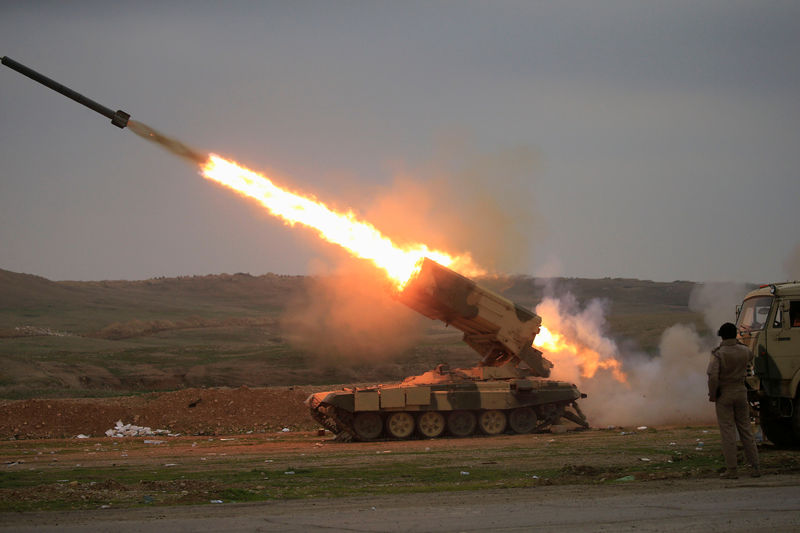By Maher Chmaytelli and Isabel Coles
BAGHDAD/ERBIL, Iraq (Reuters) - The number of civilians escaping the fighting in Mosul has increased significantly as battles intensify between U.S.-backed Iraqi forces and Islamic State militants, and some have been exposed to chemical agents, the Red Cross said on Friday.
Iraqi armed forces meanwhile said they had captured another district as they push towards the densely packed old city centre where the fighting is expected to become tougher.
Among casualties in the past 48 hours, five children and two women were treated for exposure to chemical agents, suffering blisters, eye redness, vomiting and coughing, said the International Committee of the Red Cross. [nL5N1GG35R}
The United States has warned that Islamic State could use weapons containing sulphur mustard agents to repel the offensive on the northern Iraqi city.
Iraqi forces captured the eastern side of Mosul in January after 100 days of fighting and launched their attack on the districts that lie west of the Tigris river on Feb. 19.
Defeating Islamic State in Mosul would crush the Iraqi wing of the caliphate declared by the group's leader, Abu Bakr al-Baghdadi, in 2014, over parts of Iraq and Syria, although the group is expected to continue a campaign of insurgent attacks.
The Iraqi military believes several thousand militants, including many foreigners, are hunkered down in Mosul among the remaining civilian population, which aid agencies estimated to number 750,000 at the start of the latest phase of the battle.
The battle for Mosul has killed and wounded several thousand people since it started on Oct. 17, according to aid agencies.
"We have noted a significant increase in displacement in last week, 30,000 in west Mosul, 4,000 a day or so," Matthew Saltmarsh, a spokesman for the U.N. refugee agency UNHCR, told a news briefing in Geneva.
"Of course the military fighting is intensifying by the day," Bastien Vigneau, the emergency director for Mosul operations at the U.N children's agency UNICEF, told the briefing.
Speaking from Erbil, east of Mosul, he said over 100,000 children are among the 191,000 who have been displaced in total from the city since October.
Among them, UNICEF identified 874 children who were unaccompanied or separated. More than half have been reunited with parents, and the rest are being taken care of by extended family.
The militants are using suicide car bombers, snipers and booby traps to counter the offensive waged by the 100,000-strong force of Iraqi troops, Kurdish peshmerga fighters and Iranian-trained Shi'ite Muslim paramilitary groups.
The Iraqi forces captured the Wadi Hajar district on Friday, an advance that allows them to link up all their forces in the south of the city, starting from the Tigris river and ending in the Mamoun district, according to military statements.
Intra-Kurdish fighting erupted on the sidelines of the battle, highlighting the risk of conflict and turf war between the multiple forces arrayed against Islamic State, many of which lean on regional patrons for political support and arms.
The clash broke out when Peshmerga Rojava forces moved towards the border with Syria, encroaching on territory controlled by a local affiliate of the Kurdistan Workers' Party (PKK).
The Peshmerga Rojava is made up of Kurds from Syria and was formed and trained in Iraq with the backing of Masoud Barzani, president of the Kurdish Regional Government in northern Iraq.
The clashes, which lasted several hours, pitted them against the YBS, which was set up there by the PKK after it came to the aid of the Yazidi population when the area was overrun by Islamic State in the summer of 2014.
Most Yazidis are still displaced from their homes, but some families who returned to Sinjar fled again on Friday.

"It's a struggle between two political parties but the victims are the Yazidis," said 19-year from the town of Khanasor where the clashes took place. "Aren't they supposed to be fighting Daesh (Islamic State)? Let them go and get rid of them."
(With additional reporting by Stephanie Nebehay in Geneva; Writing by Maher Chmaytelli)